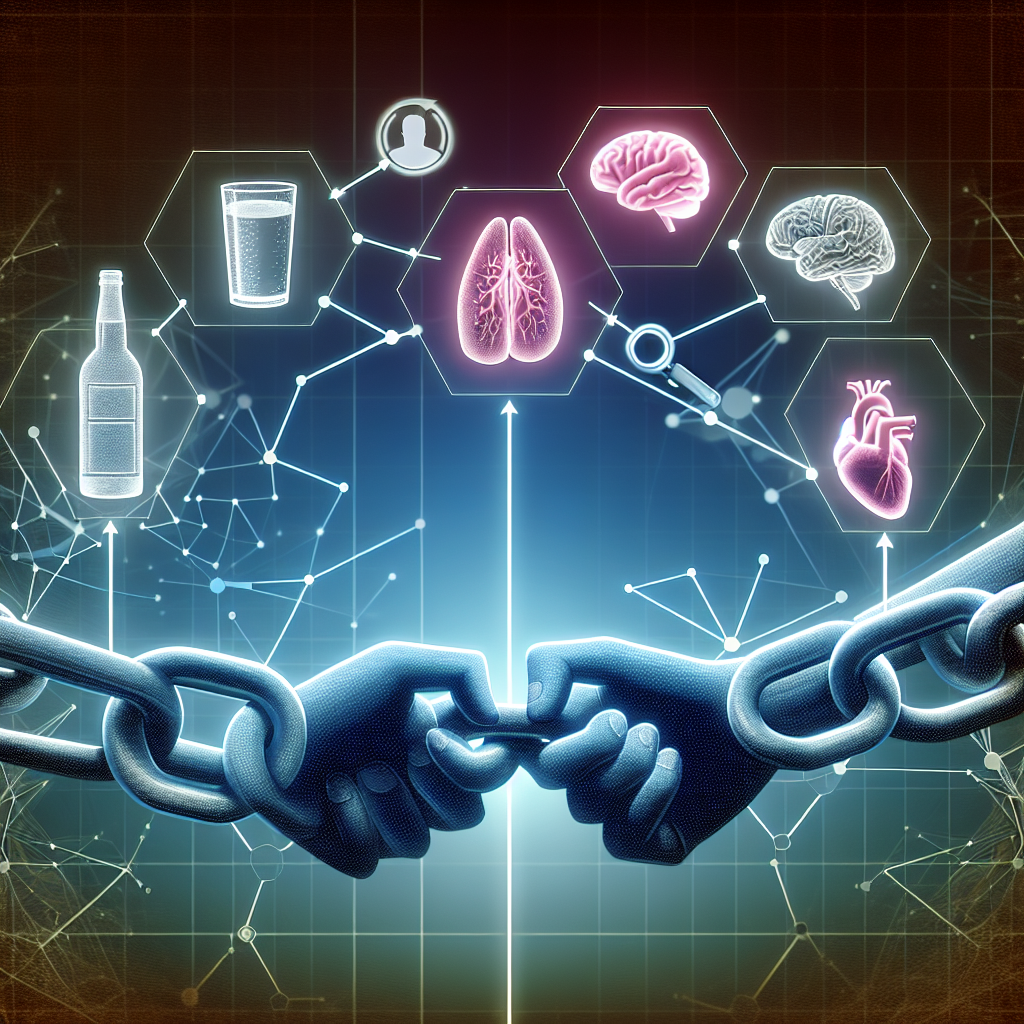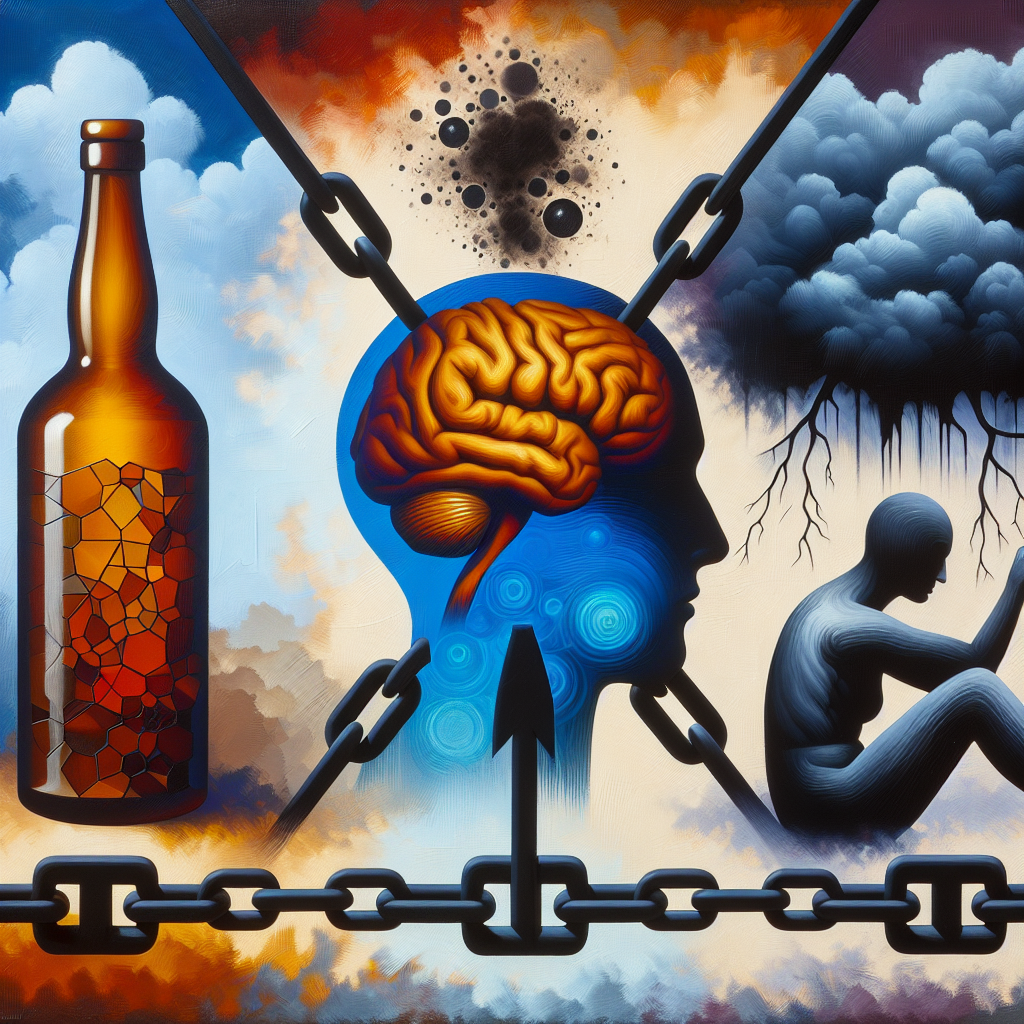-
Table of Contents

“Unmasking the Silent Struggle: The Deep Link Between Alcoholism and Mental Health”
Introduction
The connection between alcoholism and mental health is a complex and multifaceted issue that has garnered significant attention from researchers, clinicians, and public health officials. Alcoholism, or alcohol use disorder (AUD), is characterized by an inability to control drinking despite adverse consequences. It often coexists with various mental health disorders, such as depression, anxiety, bipolar disorder, and schizophrenia. This comorbidity can exacerbate the symptoms of both conditions, creating a vicious cycle that complicates diagnosis, treatment, and recovery. Understanding the intricate relationship between alcoholism and mental health is crucial for developing effective interventions and support systems to help individuals achieve and maintain sobriety while managing their mental health challenges.
The Impact Of Alcoholism On Depression And Anxiety
The connection between alcoholism and mental health is a complex and multifaceted issue that has garnered significant attention from researchers and healthcare professionals alike. Alcoholism, or alcohol use disorder, is a chronic disease characterized by an inability to control alcohol consumption despite adverse consequences. It is well-documented that alcoholism can have a profound impact on an individual’s mental health, particularly in relation to depression and anxiety. Understanding this connection is crucial for developing effective treatment strategies and fostering a supportive environment for those affected.
To begin with, it is important to recognize that alcohol is a central nervous system depressant. While it may initially produce feelings of euphoria and relaxation, prolonged and excessive consumption can lead to significant alterations in brain chemistry. These changes can exacerbate symptoms of depression and anxiety, creating a vicious cycle that is difficult to break. For instance, individuals who suffer from depression may turn to alcohol as a form of self-medication, seeking temporary relief from their emotional pain. However, this coping mechanism often backfires, as alcohol can intensify depressive symptoms over time, leading to a deeper sense of hopelessness and despair.
Moreover, the relationship between alcoholism and anxiety is equally concerning. Anxiety disorders are characterized by excessive worry, fear, and apprehension, which can be debilitating for those affected. Alcohol may initially seem to alleviate anxiety by providing a sense of calm and relaxation. However, as tolerance builds and dependence develops, the individual may find themselves needing more alcohol to achieve the same effect. This can lead to increased anxiety levels, particularly during periods of withdrawal, when the absence of alcohol can trigger severe anxiety symptoms. Consequently, the individual may become trapped in a cycle of drinking to alleviate anxiety, only to experience heightened anxiety as a result.
In addition to the direct effects of alcohol on mental health, the social and environmental consequences of alcoholism can further contribute to depression and anxiety. Alcoholism often leads to strained relationships, financial difficulties, and legal problems, all of which can exacerbate feelings of stress and isolation. The stigma associated with alcoholism can also prevent individuals from seeking help, further compounding their mental health struggles. It is essential to address these external factors in conjunction with the physiological effects of alcohol to provide comprehensive support for those affected.
Despite the challenges posed by the interplay between alcoholism and mental health, there is hope for recovery. Treatment approaches that address both the addiction and the underlying mental health issues have shown promise in helping individuals achieve lasting sobriety and improved mental well-being. Integrated treatment programs that combine behavioral therapy, medication, and support groups can provide a holistic approach to recovery. Cognitive-behavioral therapy (CBT), for example, can help individuals identify and change negative thought patterns that contribute to both their addiction and mental health issues. Medications such as antidepressants and anti-anxiety drugs can also play a role in stabilizing mood and reducing symptoms, making it easier for individuals to engage in therapy and other recovery activities.
Furthermore, fostering a supportive community is crucial for those in recovery. Support groups such as Alcoholics Anonymous (AA) and other peer-led organizations offer a sense of belonging and understanding that can be invaluable in the recovery process. Sharing experiences and learning from others who have faced similar challenges can provide the encouragement and motivation needed to stay on the path to recovery.
In conclusion, the impact of alcoholism on depression and anxiety is profound and multifaceted, but with the right treatment and support, individuals can overcome these challenges and achieve a healthier, more fulfilling life. By addressing both the addiction and the underlying mental health issues, we can pave the way for a brighter future for those affected by alcoholism.
Dual Diagnosis: Understanding The Link Between Alcoholism And Mental Health Disorders
The intricate relationship between alcoholism and mental health disorders is a subject of growing concern and interest within the medical and psychological communities. Understanding this dual diagnosis is crucial for developing effective treatment strategies and offering hope to those affected. Alcoholism, or alcohol use disorder (AUD), is characterized by an inability to control drinking despite adverse consequences. Mental health disorders, on the other hand, encompass a wide range of conditions that affect mood, thinking, and behavior. When these two issues intersect, the complexity of treatment and recovery increases significantly.
To begin with, it is essential to recognize that alcoholism and mental health disorders often coexist. Studies have shown that individuals with mental health disorders are more likely to develop alcoholism, and vice versa. This bidirectional relationship suggests that one condition can exacerbate the other, creating a vicious cycle that is challenging to break. For instance, someone suffering from depression may turn to alcohol as a form of self-medication, seeking temporary relief from their emotional pain. However, alcohol is a depressant, and its prolonged use can worsen depressive symptoms, leading to increased alcohol consumption and further deterioration of mental health.
Moreover, the underlying causes of both alcoholism and mental health disorders often overlap. Genetic predisposition, environmental factors, and traumatic experiences can contribute to the development of both conditions. For example, a person with a family history of alcoholism and mental health disorders may be more susceptible to experiencing both issues. Additionally, stressful life events such as the loss of a loved one, financial difficulties, or exposure to violence can trigger both alcoholism and mental health disorders, making it difficult to determine which condition emerged first.
Despite the challenges posed by dual diagnosis, there is hope for recovery. Integrated treatment approaches that address both alcoholism and mental health disorders simultaneously have shown promising results. These approaches often involve a combination of medication, therapy, and support groups. Medications such as antidepressants or anti-anxiety drugs can help manage the symptoms of mental health disorders, while medications like naltrexone or acamprosate can reduce alcohol cravings and support sobriety. Cognitive-behavioral therapy (CBT) and other therapeutic modalities can help individuals develop healthier coping mechanisms and address the root causes of their conditions.
Furthermore, support groups such as Alcoholics Anonymous (AA) and Dual Recovery Anonymous (DRA) provide a sense of community and shared understanding for individuals facing dual diagnosis. These groups offer a safe space for individuals to share their experiences, gain insights from others, and receive encouragement on their journey to recovery. The power of peer support cannot be underestimated, as it fosters a sense of belonging and reduces feelings of isolation.
In addition to professional treatment and support groups, lifestyle changes can also play a significant role in recovery. Engaging in regular physical activity, maintaining a balanced diet, and practicing mindfulness techniques such as meditation or yoga can improve overall well-being and reduce the risk of relapse. Building a strong support network of family and friends who understand and support the recovery process is equally important.
Ultimately, understanding the link between alcoholism and mental health disorders is a crucial step toward effective treatment and recovery. By recognizing the interconnected nature of these conditions and adopting a comprehensive, integrated approach to treatment, individuals can find hope and healing. The journey to recovery may be challenging, but with the right support and resources, it is entirely possible to overcome the dual diagnosis and lead a fulfilling, healthy life.
Q&A
1. **Question:** How does alcoholism impact mental health?
**Answer:** Alcoholism can exacerbate mental health issues such as depression, anxiety, and bipolar disorder, often leading to a vicious cycle where mental health problems and alcohol abuse feed into each other.
2. **Question:** Can mental health disorders increase the risk of developing alcoholism?
**Answer:** Yes, individuals with mental health disorders like depression, anxiety, or PTSD are at a higher risk of developing alcoholism as they may use alcohol as a coping mechanism to manage their symptoms.
Conclusion
The connection between alcoholism and mental health is complex and bidirectional. Alcoholism can exacerbate existing mental health conditions such as depression, anxiety, and bipolar disorder, while these mental health issues can also increase the risk of developing alcohol dependence. The interplay between these factors often creates a vicious cycle, where alcohol is used as a coping mechanism for mental health symptoms, leading to increased consumption and further deterioration of mental health. Effective treatment requires a comprehensive approach that addresses both the substance use disorder and the underlying mental health issues simultaneously. Integrated care models that combine psychological therapy, medical treatment, and support groups have shown promise in improving outcomes for individuals struggling with both alcoholism and mental health disorders.



